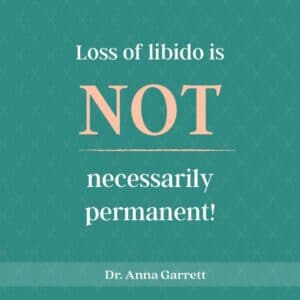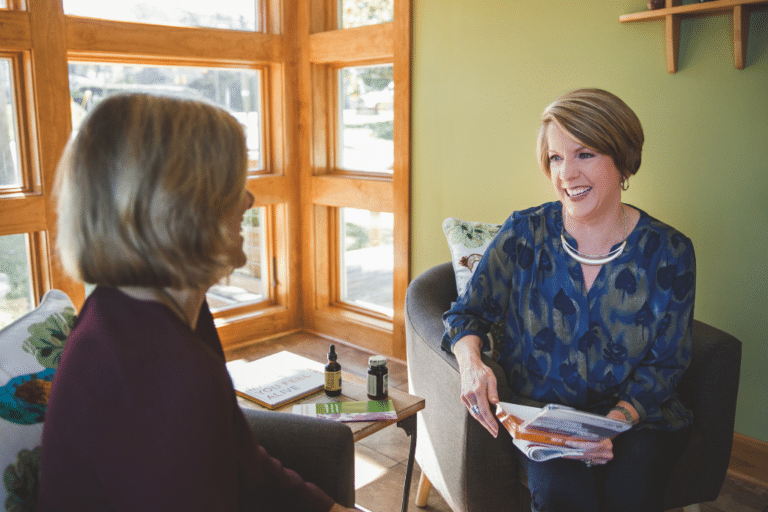Libido zapped? Here’s what to do!
One of the most common complaints from my clients is that their sex drive is G.O.N.E. It’s distressing to them and hard on their relationship with their partner. Issues with sexual desire in midlife generally peak around ages 35 to 64. And while I’d like to say there’s an easy fix, women are much more complicated than men when it comes to sex.
So, what’s happening to your libido? Well, a lot is going on!
Hormones are changing.
Roles are changing.
Relationships can become “meh.”
Stress may be through the roof.
Feelings about your body changes can cause shame.
All of this is a recipe for a libido that crashes and burns!
So what’s the fix for sex drive issues? The first step is to tease out the root causes and address them. Let’s take a look at things that take the sizzle out of sex.
Pain, Dryness, and Other Hormonal Issues
Before menopause, your libido peaks just before and after you ovulate to encourage baby-making. But when you begin to ovulate less frequently, those revved-up days in your cycle vanish. Progesterone levels tumble. Declining estrogen means less blood flow to the vagina, which means thinning tissue and dryness. So, when you do have sex, it hurts. And who craves more when it feels like THAT?
What helps
Start by addressing pain. To do that, you need to fix the underlying thinning of vaginal tissue. Over-the-counter water- or silicone-based lubricants will reduce friction, but they don’t solve the problem. Vaginal estrogen or DHEA work to plump up thin tissue. My clients and friends who have tried this product have raved about it. And even better, it’s available without a prescription and has a free trial.
You can also ask your doctor about low-dose vaginal estrogen in a cream, suppository, or ring.
The drug ospemifene is used to treat severe vaginal pain due to menopause, but it can cause hot flashes. The medication, flibanserin, is approved for premenopausal women with hypoactive sexual desire disorder (loss of libido) with no other underlying causes. But it comes with a whole host of issues and hasn’t been shown to be that effective. You can read more about that here.
Midlife Stress
In midlife, many of us are deep into a marriage, a job, raising teens, and possibly caring for our parents. Any of these things can amp up stress, and the tension puts your sex drive in “park.” Avoiding sex because “you’re not feeling it” can, in turn, make you get along less well with your partner and further add to the stress.
What Helps
Make plans for dates and lovemaking, even if you never had to do this before. Downplay the focus on sex and focus on just making time to be together, along with foreplay, massage, and any forms of sex that you find pleasurable. Consider getting short-term couples counseling when your sex life or relationship in general hits a rough patch.

Want to create a custom longevity health plan?
You’re in the right place.
I can help you with a functional approach to midlife women’s health including hormone balance, gut health, autoimmune issues, bone health, heart health and more!
Normal Aging
Desire generally slows with age for both women and men. Women are two to three times more likely to have this problem. This slowing is, in part, due to a drop in testosterone. Men also experience this drop, but they have much larger blood levels than women at baseline. Testosterone is the hormone active in every stage of sex response, starting with desire.
What Helps
There’s no FDA-approved testosterone therapy for women. However, compounded creams or injections may help.
But there’s good news about aging and sex, too. Many women say they feel an uptick in desire after menopause because of fewer worries about pregnancy, kids finally out of the house, etc.
Mood Disorders and Meds
Depression and anxiety can add to sexual problems, and menopause itself can cause mood changes. Women get mood disorders more than men, and they peak around 40 to 59.
It doesn’t help that the main treatments for depression, SSRI and SNRI antidepressant drugs, can also dampen desire and slow sexual response. Many women who aren’t depressed are prescribed antidepressants short-term to deal with hot flashes and other menopause symptoms. Though the pills may help these problems, they can really backfire on your sex life.
What Helps
See a doctor about treating depression with both pills and talk therapy. Some non-SSRI antidepressants, such as bupropion, cause fewer sexual side effects.
Your Thinking
If graying hairs, extra pounds, and dry skin make you see yourself as “old,” you’re less likely to see yourself as “hot.” However, you are fully in charge of how you think about these things. Instead of focusing on what you DON’T love about your body, focus on the things you can appreciate about it.
Women may also blame menopause for lost desire when other health problems are the real stoppers—common culprits: bladder problems, an underactive thyroid, chronic pain, and medication side effects.
What Helps
Get a checkup to ensure there’s nothing else going on with symptoms that bother you. Then make time to take care of your body and relationships now, it pays off in many ways, including more fun in bed. Your brain is one of your best sex organs.
 Mojo that is MIA in perimenopause and menopause can be frustrating. It’s important to note that any loss of libido during perimenopause is not necessarily a permanent condition. Once the hormonal chaos of perimenopause passes, many women report the return of their sexual desire. With the added benefit of hormone therapy to address any potential physical issues, there is no reason that women in midlife cannot continue to enjoy a healthy sex life.
Mojo that is MIA in perimenopause and menopause can be frustrating. It’s important to note that any loss of libido during perimenopause is not necessarily a permanent condition. Once the hormonal chaos of perimenopause passes, many women report the return of their sexual desire. With the added benefit of hormone therapy to address any potential physical issues, there is no reason that women in midlife cannot continue to enjoy a healthy sex life.
Dr. Anna Garrett is a menopause expert and Doctor of Pharmacy. She helps women who are struggling with symptoms of perimenopause and menopause find natural hormone balancing solutions so they can rock their mojo through midlife and beyond. Dr. Anna is the author of Perimenopause: The Savvy Sister’s Guide to Hormone Harmony. Order your copy at www.perimenopausebook.com.
Dr. Anna is available for 1-1 consultation. Find out more at www.drannagarrett.com/lets-talk




